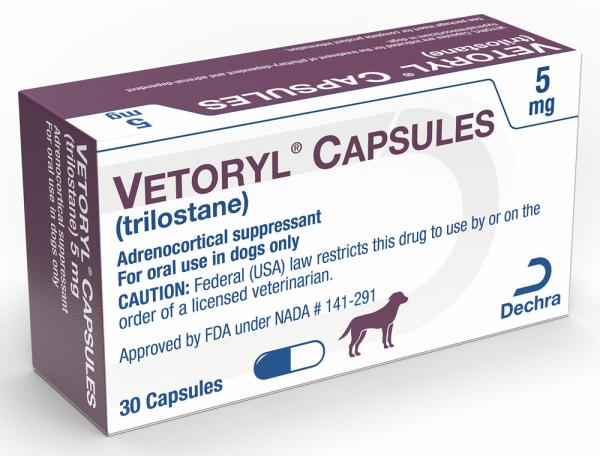Vetoryl is a prescription medication prescribed to aid in your dog s treatment of hyperadrenocorticism also known as cushing s disease.
Vetoryl for dogs side effects.
In cats side effects include lethargy anorexia and dulled mental activity.
But this may be increased to 3 milligrams a day for larger breeds of dogs.
This medication treats both pituitary dependent and adrenal dependent cases and controls the excess production of cortisol caused by the disease.
Vetoryl is a prescription only medicine available only from your veterinarian.
Common side effects may include vomiting diarrhea lethargy reduced appetite dullness weakness and lack of energy.
Vetoryl trilostane is a very safe product.
The most common adverse reactions reported are poor reduced appetite vomiting lethargy dullness diarrhea and weakness.
However vetoryl side effects are common and can include reduced appetite vomiting lethargy and change in bowel movements typically diarrhea.
However vetoryl for dogs has been proven safe and effective in most cases of hyperadrenocorticism.
Actually has been shown to be better than using lysodren.
The side effects of vetoryl for dogs with cushings disease are often dependent on the dosage and the size of the dog.
Both of these products have side effects like anorexia ataxia muscle coordination problems lethargy weakness weight loss and gastrointestinal disturbance which should be monitored through regular check ups and acth tests and then according to the dog s status therapies should changed as needed.
More severe side effects can include bloody diarrhea sodium potassium imbalance and adrenal necrosis which can result in your dog s death.
In very rare occasions more serious side effects may occur after using vetoryl.
This site is provided as an information service for veterinary professionals and the owners of dogs who have been prescribed vetoryl by their vet.
These side effects include allergic reaction severe depression bloody diarrhea or collapse.
Hypoadrenocorticism can occur and is usually reversible once the medication is discontinued but in very rare cases adrenal gland damage and death can occur in dogs.
The main side effects are lethargy inappetence and mild electrolyte abnormalies but they are all related to the steroid withdrawl rather than adverse effects from the medication.
Any questions about your dog should be directed to your veterinary practice.
Occasionally more serious reactions including severe depression hemorrhagic diarrhea collapse hypoadrenocortical crisis or adrenal necrosis rupture may occur and may result in death.
There are some risks of minor side effects mainly a decrease in appetite vomiting diarrhea and lethargy.

